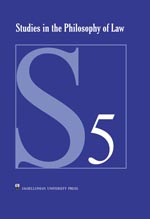Revisiting Equality in Exchange Revisited: Contemporary Evolutionary (Genetic and Cultural) Approaches to Human Behaviour and the Normativity of Law
Revisiting Equality in Exchange Revisited: Contemporary Evolutionary (Genetic and Cultural) Approaches to Human Behaviour and the Normativity of Law
Author(s): Bart Du LaingSubject(s): Law, Constitution, Jurisprudence
Published by: Wydawnictwo Uniwersytetu Jagiellońskiego
Keywords: law; philosophy of law; law and biology; biojurisprudence; legal ethics;
Summary/Abstract: When it was originally written, the goal of this chapter was to construct a small part of what has been called a bio-legal history of contractual promises and their laws.1 However, such an enterprise necessarily entails prior reflection on how best to go about such an attempt to construct these bio-legal histories. Indeed, I mainly hoped, and still do, to show why evolutionary analysis in law, as well as its legal philosophical counterparts, could benefi t considerably from incorporating culture – and its accompanying evolutionary theory – more explicitly into its models than seems to be the case at present. This should allow me to contrast my approach with some of the views expressed in Wojciech Załuski’s recent book on Evolutionary Theory and Legal Philosophy, addressing questions lying at the heart of what could become an “evolutionary current in legal philosophy.” To this end, I will draw on the legal example of equality in exchange in contract law on the one hand and on recent research on human cooperative behaviour on the other. I will start by making some remarks on the issue of substantive fairness in legal contract theory and in legal anthropology (Section II). I will then briefl y sketch some results of experiments commonly used in behavioural economics to shed light on human pro-social behaviour (Section III). These two introductory sections actually cover topics that are, of course, quite broad in their own right. Hence, it should be noted that they are not meant to provide a complete overview of either of these two approaches to the phenomenon of (substantive) fairness. They should, however, set the stage for an exposition of an expansive evolutionary theoretical framework underlying a particular interpretation of the experimental data. This encompassing evolutionary theoretical framework also has a bearing on an explanation of the evolved cooperative dispositions of our species.
Journal: Studies in the Philosophy of Law
- Issue Year: 2010
- Issue No: 5
- Page Range: 83-102
- Page Count: 20
- Language: English

